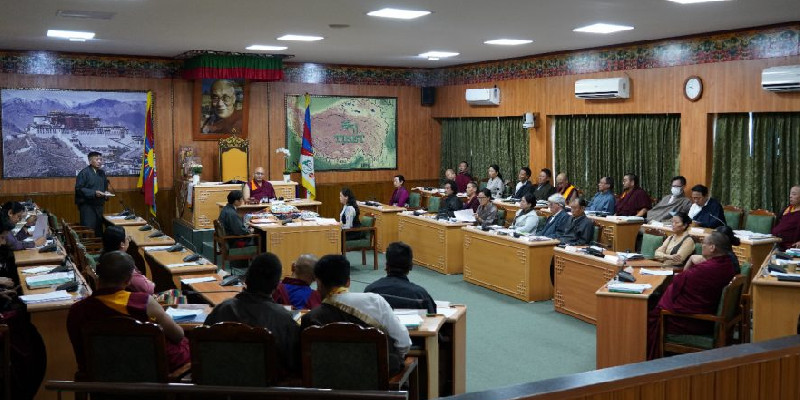The 8th session of the 17th Tibetan Parliament-in-Exile (TPiE), held from September 11 to 19, 2024, was marked by key legislative discussions, but also significant disruptions and disappointments. The session, which brought together Tibetan leaders, including Speaker Khenpo Sonam Tenphel and Sikyong Penpa Tsering, dealt with challenges that highlighted the complex dynamics within the Tibetan exile community.
Key Takeaways:
The session also dealt with the delicate issue of the reincarnation of His Holiness the Dalai Lama. Sikyong Penpa Tsering addressed mounting concerns about potential Chinese interference in this sacred tradition, affirming that the CTA is actively working to safeguard this process from outside influence. His comments came amid rising fears that China might attempt to manipulate the reincarnation process to legitimize its control over Tibet.
Security was also a major focus, with parliamentarians commending the Department of Security for its successful efforts in safeguarding His Holiness the Dalai Lama. Notably, the session praised the resumption of the Australia Immigration Program, which aids former Tibetan political prisoners in resettling abroad. The Department of International Relations (DIIR) drew attention for its strategy to counteract China’s increasing global influence, particularly its attempts to suppress Tibetan identity through initiatives like the use of “Xizang” instead of “Tibet” in international forums.
The long-standing vacancy in the Tibetan Supreme Justice Commission (TSJC) was one of the most contentious issues during the session. A proposed amendment to adjust the qualifications for commissioners had been delayed for years, creating a significant legislative bottleneck. On September 14, the situation escalated when several parliamentarians refused to attend the session, citing safety concerns due to a protest organized by the “People’s Movement for Securing the CTA.” The protesters demanded action on the delayed amendment, which had been ignored for years. After receiving security assurances from the CTA’s Department of Security, the session resumed, and the amendment was finally passed, extending the exemption for judicial qualifications by another decade to ensure the TSJC’s functionality.
This amendment had been a significant roadblock in the Tibetan Parliament-in-Exile, causing delays and disruptions in both current and past sessions. The core issue was the inability to appoint judges under the strict qualifications outlined in the Charter, which required either judicial experience or years of advocacy. For nearly three years, this impasse jeopardized the judiciary’s stability, a crucial pillar of Tibetan democracy. Following much debate, deliberation, and pressure from advocacy groups, the Parliament successfully passed the amendment, extending the exemption for another decade. This resolved the long-standing issue, allowing for continuity in the TSJC and overcoming a key obstacle to legislative progress.
Another significant development was the failure of a bill proposing the inclusion of the Jonang tradition as the fifth Buddhist school represented in the Parliament. The bill, introduced by the Kashag, aimed to add Jonang alongside the Nyingma, Kagyu, Sakya, Gelug, and Yungdrung Bon schools. Despite long-standing requests from Jonang leaders for representation, the bill fell short of the required votes, receiving only 21 out of 30.
The International Jonang Well-being Association expressed deep disappointment following the bill’s failure, criticizing the continued exclusion of Jonang from the Parliament. They noted that despite recognition by the Dalai Lama in 2011, the Jonang tradition remains unrepresented in the charter, fueling frustrations within the community. The association also pointed out that the lack of representation has persisted for 27 years, despite multiple petitions and protests, including a hunger strike in 2015.
Despite these setbacks, the session saw some positive outcomes. Speaker Tenphel highlighted growing international support for the Tibetan cause, including the U.S. adoption of the Resolve Tibet Act, Canadian motions supporting Tibetan self-determination, and renewed attention from Australian lawmakers. These developments were seen as key victories in Tibet’s ongoing struggle against Chinese occupation.
The session concluded with a unanimous expression of solidarity with Tibetans inside Tibet, where repression continues to escalate. However, the lack of quorum disrupted the session, preventing key decisions from being made, while the exclusion of Jonang from formal representation continues to spark frustration. Therefore, as the Parliament moves forward, these unresolved issues remain a challenge to unity within the Tibetan exile community.







Leave a Reply